Vietnam, with its expansive coastline and diverse marine ecosystems, beckons travelers with the promise of captivating underwater adventures. However, awareness of the presence of sharks in Vietnamese waters is paramount to ensure both safety and enjoyment. This article delves into the significance of comprehending these marine creatures for travel safety.
Contents
The Presence of Sharks in Vietnam’s Waters
Vietnam, with its extensive coastline and thriving marine ecosystems, offers an exceptional opportunity for those interested in exploring the subaquatic realm. Among the myriad of marine species that inhabit Vietnamese waters, sharks stand out as a captivating attraction for both divers and snorkelers. In this section, we shall delve into the distribution and habitats where sharks are commonly encountered in Vietnam.
Are There Sharks In Vietnam?
Yes, there are sharks in the waters off the coast of Vietnam. Vietnam’s coastal waters are home to various species of sharks, including reef sharks, nurse sharks, and other pelagic species. However, it’s important to note that the presence of sharks in Vietnamese waters does not necessarily mean that they are common or pose a significant threat to swimmers or divers.
Indeed, encountering sharks directly on Vietnamese beaches is a rare occurrence. Sharks tend to inhabit deeper waters, making direct beach encounters infrequent. The latest shark encounter in Vietnam occurred in July 2022, while press reports of such encounters date back over a decade.
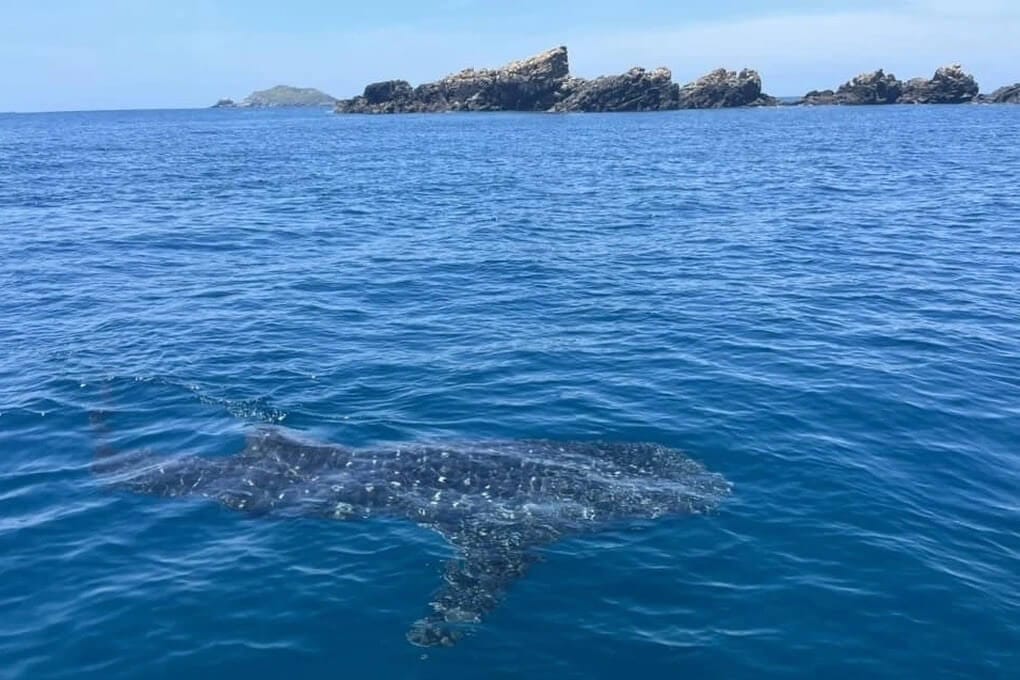
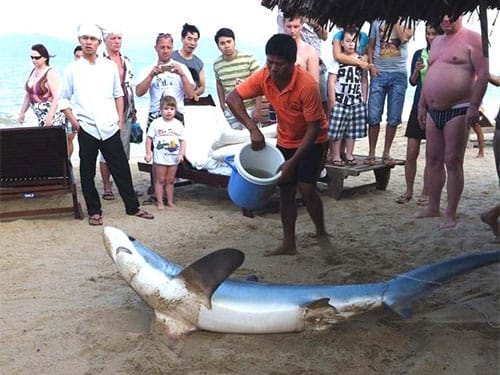
When adhering to designated areas and following instructor guidance, diving and swimming at Vietnamese beaches are generally considered safe.
Sharks in Vietnam
Vietnam boasts a diverse array of shark species, each distinguished by unique characteristics. Some of the most frequently encountered shark species in Vietnamese waters include:
- Blacktip Reef Shark (Carcharhinus melanopterus): These relatively small sharks, recognizable by their black-tipped dorsal fins, inhabit shallow coastal waters, making them a common sight for divers near coral reefs.
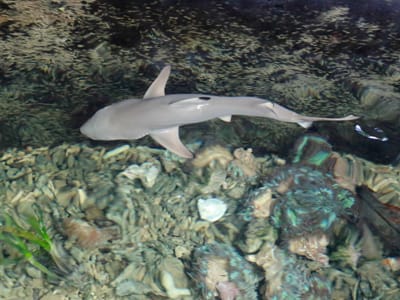
Blacktip Reef Shark Breed Naturally in Khanh Hoa - Whale Shark (Rhincodon typus): As the largest fish species globally, whale sharks, the gentle giants of the sea, are frequently spotted in Vietnam’s waters, especially in areas rich in plankton.
- Grey Reef Shark (Carcharhinus amblyrhynchos): These sleek and agile sharks are often observed patrolling the depths of Vietnamese dive sites. They possess a grayish hue and distinctive white dorsal fin tips.
- Bamboo Shark (Chiloscyllium spp.): Typically encountered by night divers, bamboo sharks are small, bottom-dwelling species characterized by their slender bodies and diminutive fins.
Regions and Habitats
Sharks in Vietnam predominantly inhabit the central seas, stretching from Da Nang southwards. This region stands out for its greater depth and protrusion into the East Sea, rendering it an ideal habitat for these majestic creatures. However, this area has also witnessed the exploitation of sharks for their fins, primarily occurring from Quang Ngai to Nha Trang, south of Truong Sa.
Although sharks are present in the northern seas, sightings are comparatively less frequent. The concentration of these apex predators tends to be more pronounced in the central waters due to favorable environmental conditions.
- Phu Quoc Island: Nestled in the Gulf of Thailand, Phu Quoc is celebrated for its vibrant coral reefs and diverse marine life. Divers frequently encounter blacktip reef sharks in the shallow waters, particularly around the An Thoi Archipelago and Hon Thom Island.
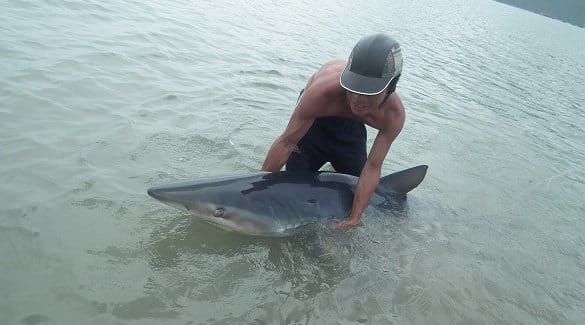
People Free A Stranded Shark At Con Dao Island (Source: Vietnamnet) - Con Dao Islands: This remote and unspoiled archipelago is renowned for exceptional shark encounters. Divers have the opportunity to witness grey reef sharks and, on rare occasions, even the majestic whale sharks in the crystal-clear waters surrounding Con Dao.
- Nha Trang: A coastal city popular among divers of all levels, Nha Trang boasts the Hon Mun Marine Protected Area, a shark hotspot where divers can spot blacktip reef sharks among various marine species.
- Phu Yen: Located in central Vietnam, Phu Yen is emerging as a destination for divers seeking untouched coral reefs and a diverse underwater ecosystem. Bamboo sharks and blacktip reef sharks frequent the tranquil waters here.
Using eSIM to keep in touch with your friends and family during your Vietnam trip.
Safety Considerations
While encounters with sharks can be awe-inspiring, prioritizing safety is paramount when diving or snorkeling in shark-populated areas. Here are essential safety tips:
- Respect Wildlife: Maintain a safe distance from sharks, refraining from touching or provoking them. Remember, these are wild animals.
- Dive with Professionals: Opt for reputable dive operators with experienced guides who can ensure safe interactions with sharks.
- Stay Informed: Familiarize yourself with local regulations and guidelines governing shark encounters.
- Maintain Calm: In the unlikely event of a close encounter, keep calm and follow the guidance of your dive guide.
Shark Safety Guidelines for Travelers
Embarking on underwater adventures, with the potential for shark encounters, is an exhilarating prospect for many travelers. However, comprehending the factors influencing shark behavior and adhering to safety measures are essential for a harmonious coexistence between humans and these magnificent creatures. In this section, we will explore the factors shaping shark behavior, identify potential risk factors, and offer specific precautions for engaging in water activities such as diving and snorkeling.
Understanding Shark Behavior
- Feeding Patterns: Sharks are opportunistic feeders, primarily preying on marine life such as fish and seals. However, they may investigate unfamiliar objects or individuals in their territory.
- Environmental Factors: Shark behavior is significantly influenced by water temperature, visibility, and prey availability. Certain species may be more active during specific times of the day or particular seasons.
- Natural Curiosity: Sharks are inherently curious creatures. They may investigate objects or people in their vicinity out of curiosity, often without displaying aggressive behavior.
Identifying Potential Risk Factors
- Food Presence: Avoid swimming near areas where fishing or baiting activities are occurring, as these can attract sharks searching for food.
- Schools of Fish: Exercise caution if you encounter schools of fish suddenly behaving erratically, as this may indicate the presence of a predator, such as a shark, in the vicinity.
- Shark Species: Familiarize yourself with the prevalent shark species in the region you plan to visit. Some species are more likely to engage with humans than others.
- Blood or Excessive Splashing: Sharks possess highly developed senses, including an acute sense of smell. It is advisable to avoid being in the water with open wounds or engaging in excessive splashing, as these factors can attract sharks.
Precautions for Diving and Snorkeling
- Dive with Professionals: When embarking on diving or snorkeling adventures in areas known for shark encounters, choose reputable dive operators with experienced guides. These professionals are well-versed in shark behavior and can ensure safe interactions.
- Avoid Flashy Jewelry: Refrain from wearing shiny jewelry or brightly colored swimsuits, as these can resemble the appearance of fish scales, potentially attracting sharks.
- Stay in Groups: Sharks are more likely to approach solitary individuals. Staying in a group can reduce the chances of a shark mistaking you for prey.
- Respect Their Space: Maintain a respectful distance from sharks if you encounter them underwater. Do not attempt to touch or ride them, as this can agitate the creatures.
- Be Calm and Still: In the rare event of a close encounter, maintain a calm demeanor, and try to remain as still as possible. Quick and erratic movements can trigger defensive responses.
- Follow Local Guidelines: Adhere to local regulations and guidelines regarding shark interactions. Some areas may have specific rules in place to protect both humans and sharks.
Tips and must-have items in your Vietnam packing list.
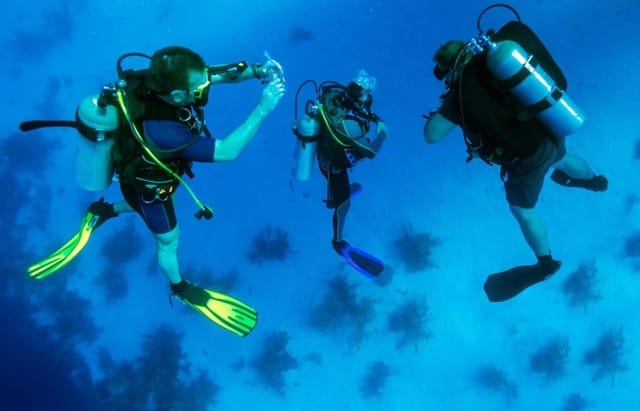
Responsible Tourism and Shark Conservation: Fostering Ethical Encounters and Sustainable Practices
Tourism, when approached with diligence and a commitment to environmental stewardship, wields substantial influence in shaping the fate of our planet’s ecosystems. An area of paramount importance in this regard is the preservation of sharks through responsible tourism. Often shrouded in myth and fear, these apex predators serve as linchpins in marine ecosystems. This article explores the imperative of promoting ethical wildlife interactions and responsible conduct while also advocating for sustainable tourism practices to bolster shark conservation efforts.
Promoting Ethical Wildlife Encounters
- Education as the Bedrock: An informed tourist is an empowered one. The foundation of responsible tourism in shark conservation is education. It is essential that tourists gain insights into the pivotal roles sharks play in oceanic equilibrium. Acquainting oneself with their behavioral patterns, habitats, and vulnerabilities cultivates respect and compassion.
- Non-Intrusive Observation: Responsible tourism champions non-intrusive observation methods, notably snorkeling and diving, as they permit tourists to witness sharks in their natural milieu without unduly disturbing or distressing these creatures. Such encounters can be both thrilling and enlightening when conducted conscientiously.
- Refraining from Shark Feeding Activities: Refraining from shark feeding excursions is a cardinal principle. While the allure of close encounters is undeniable, these activities can disrupt natural feeding behaviors and instigate unhealthy dependencies on human provisioning.
Supporting Sustainable Tourism Practices
- Discerning Tour Operator Selection: Tourists must be discerning in their choice of operators, favoring those dedicated to sustainable and ethical practices. Such operators prioritize the welfare of sharks and their environments, ensuring minimal ecological impact.
- Limiting Group Sizes: Restricting the size of tour groups not only mitigates environmental footprints but also facilitates more controlled and respectful engagements with sharks.
- Honoring Protected Areas: Many regions have demarcated marine protected areas (MPAs) where concerted shark conservation efforts are underway. Tourists bear the responsibility of adhering to regulations and guidelines that safeguard these vital sanctuaries.
- Patronizing Sustainable Enterprises: Support for businesses offering sustainable shark-related products, such as responsible shark diving experiences, fosters responsible tourism. Many of these entities allocate a portion of their revenues to bolster shark conservation endeavors.
Stay informed about scams in Vietnam to protect yourself from trouble.
Conclusion
In conclusion, understanding shark behavior, promoting responsible tourism, and supporting conservation efforts are pivotal for safe and ethical encounters with sharks in Vietnam. By respecting these magnificent creatures and their habitats, travelers can enjoy enriching experiences while contributing to their preservation.
Frequently Asked Questions
Q1: Are there great white sharks in Vietnam’s waters?
A1: No, great white sharks (Carcharodon carcharias) are extremely rare in Vietnamese waters. While there have been sporadic sightings, they are not commonly found in the region. Other shark species that are more frequently observed in Vietnam include blacktip reef sharks, whale sharks, grey reef sharks, and bamboo sharks.
Q2: Do sharks live in Vietnamese waters?
A2: Yes, Vietnamese coastal waters are home to various shark species, each with unique characteristics. Sharks are particularly abundant in the central seas, from Da Nang southwards, where the deeper waters and the protrusion into the East Sea provide an ideal habitat for these magnificent creatures. However, this area has also experienced shark exploitation for their fins, primarily occurring from Quang Ngai to Nha Trang, south of Truong Sa. The concentration of these apex predators is more significant in the central waters due to favorable environmental conditions.


Related Posts
Saigon’s “Flower Market Replica”: Where To Find Them
Ho Chi Minh City’s floral charm is not limited to its bustling wholesale markets. Imagine wandering through a place where vibrant petals, fragrant blooms, and the spirit of traditional Vietnamese markets come alive—without the overwhelming crowds. A flower market replica captures that magic, blending the beauty of fresh flowers with the charm of a curated, […]
Is it Safe to Travel to Vietnam Right Now? A Complete 2025 Guide
Vietnam has emerged as one of Southeast Asia’s most captivating destinations, drawing millions of visitors annually with its rich culture, stunning landscapes, and incredible cuisine. However, many travelers still ask: Is it safe to travel to Vietnam right now? This comprehensive guide provides you with everything you need to know about Vietnam travel safety in […]
Ho Chi Minh Cu Chi Tunnels Tour: The Ultimate Guide
The Cu Chi Tunnels stand as one of Vietnam’s most remarkable historical sites, offering visitors a profound glimpse into the ingenuity and resilience displayed during the Vietnam War. For travelers, a Ho Chi Minh Cu Chi tunnels tour represents an essential experience that combines education, adventure, and deep cultural understanding. This comprehensive guide will help […]